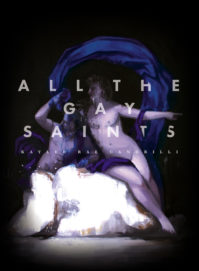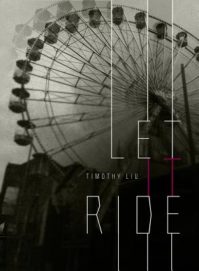All the Gay Saints
Kayleb Rae Candrilli
Saturnalia Books ($16)
Let It Ride
Timothy Liu
Saturnalia Books ($16)
by Allison Campbell
What must one sacrifice to be honest and in love? To face desire and endure its emptiness? To create and maintain relationships, or to abandon the idea of “relationship” meaning anything at all outside the present moment of conversation or coitus? Two recent books offer two vastly different takes on, for lack of a better phrase, modern love. Kayleb Rae Candrilli’s All the Gay Saints and Timothy Liu’s Let It Ride bring to mind William Blake’s archetypal Songs of Innocence and of Experience, if the former grappled with the burgeoning selfhoods that come with mapping a transitioning body, and the latter included radiographed faux-Bosch paintings and fleeting encounters choreographed via Grindr.
 Blake’s narrator in “The Lamb” asking, “Little Lamb who made thee / Dost thou know who made thee” could not have anticipated the depths Candrilli plumbs throughout All the Gay Saints around questions of identity. Poem after poem in the collection looks brazenly and lovingly at how we are both made and unmade by ourselves and through our relationships. As in Blake, the exploration is both physical and metaphysical; in “Our Root System is a Tangle of Pipecleaners (Or, Being your Man has Made Me One)" Candrilli addresses their partner, “You lick my wounds / and yours, and we are both healing faster than ever, aren’t we?” The statement of faith here, followed quickly by the question “aren’t we,” is emblematic of the simultaneously hopeful, reticent, and continually nascent tone that dominates and energizes All the Gay Saints. Here’s another example:
Blake’s narrator in “The Lamb” asking, “Little Lamb who made thee / Dost thou know who made thee” could not have anticipated the depths Candrilli plumbs throughout All the Gay Saints around questions of identity. Poem after poem in the collection looks brazenly and lovingly at how we are both made and unmade by ourselves and through our relationships. As in Blake, the exploration is both physical and metaphysical; in “Our Root System is a Tangle of Pipecleaners (Or, Being your Man has Made Me One)" Candrilli addresses their partner, “You lick my wounds / and yours, and we are both healing faster than ever, aren’t we?” The statement of faith here, followed quickly by the question “aren’t we,” is emblematic of the simultaneously hopeful, reticent, and continually nascent tone that dominates and energizes All the Gay Saints. Here’s another example:
DURING MY TOP SURGERY CONSULTATION, MY PARTNER SAYS TO THE DOCTOR, TELL ME WHAT YOU WILL DO TO THEIR VEINS
and no answer will satisfy true
blood flow or this boy who loves me.The truth is, as I sleep, everything directly above
my heart will be cauterized.Facts are difficult
if you are able to recognize themas fact. And I am scared
of my partnerbeing faced with my blood
because I love them.When we talk of the future, my future chest is as flat
as our future backyard. We planta lemon tree and it grows
even in winter.
 The narrative voice of Timothy Liu’s Let It Ride may be less nascent than that of All the Gay Saints, but the poems are no less searching. In Songs of Experience, Blake’s child-narrator in “The Chimney Sweep” claims adults are the ones “Who make up a heaven of our misery.” In kind turn, Liu’s “True Value” begins, “Why not destroy the thing you / love most?” And after working back through adolescent memory, the poem comes to explain,
The narrative voice of Timothy Liu’s Let It Ride may be less nascent than that of All the Gay Saints, but the poems are no less searching. In Songs of Experience, Blake’s child-narrator in “The Chimney Sweep” claims adults are the ones “Who make up a heaven of our misery.” In kind turn, Liu’s “True Value” begins, “Why not destroy the thing you / love most?” And after working back through adolescent memory, the poem comes to explain,
You can walk
past a painting a hundred timesand never stop to take it in,
then one day, you’re thumbing
through a gift sent by someoneyou adore, and you have to
work hard to keep your tears
from splashing on a godforsakenraft.
Here, and in other poems in Let It Ride, Liu seems to question how we truly see what is physically, literally before us. To put it simply, Candrilli’s poems reach from the inside out, asking: How do you see your way to physical manifestation of what you want? By contrast, Liu’s poems seem to move from the outside in, asking: How do you fully see what is physically manifest?
In “Pilgrimage,” Liu describes his encounter with the Met’s one legitimate painting by Hieronymous Bosch, Adoration of the Magi. About the work’s pastoral background—a couple dancing in the distance, rolling hills—Liu concludes the scene is
reminding us all
that we are nothing
more than a wayward
flock in search
of someone to gather us
This is a depiction of life that Liu rejects, or at least finds disappointing. And who can blame them if the narrator prefers, as the poem states, the “angst-ridden / tableaus of the flesh / scorched and flayed / in the next gallery”? These other scenes may be critically complicated by their once-false attribution to Bosch, instead of a “follower of Bosch,” but this detail does nothing to detract from the speaker’s engagement with Christ’s Descent into Hell, a painting they are compelled to reach out and touch when the security guard has turned their back. Liu’s imagery and interiority make it easy, by the end of the poem, to share the speaker’s attraction to “layers that render / this particular hell / more translucent.” At least we can see what we’re getting into! Similarly convincing is the poem’s ending, which values presence over some possibly contrived form of authenticity. The speaker observes teenagers taking selfies in front of the painting and comments that it
hardly matters
who or when
this thing was painted—
only that we’re here.”
Both poets repeatedly expose something hopeful in the present moment. Although they approach these moments from varying places of solace or suffering, they both seem to believe in an inherent promise to being here. In “There is a Point at Which I Tire of My Own Fear,” Candrilli admits that “Queers are killed / and have always been killed in any number / of ways” and holds space for a redeeming love:
When I meet my partner, my partner meets me
back. Against the wall
we kiss and both note that today, what breaks us
is only the sun
through the blinds.
In “The Beloved,” dark and frolicking, Lui writes of “the new steps / you took to choreograph grief.” And “Ars Poetica: At Fifty” ends:
Love allows
our tongues to followthirst to whatever needs
to be reached—a cube
of ice on a hot stoveriding its own melting.
Candrilli’s “Thoughts on Romance as the Heat Index Rises” can be read as an inadvertent response to this melting:
I open my mouth and, despite the world,
use it almost daily to fall in love.This is so direly human of me—
so egregiously alive. I feellucky to hold my partner’s skin
and their hunger on my tonguealways. I am thankful that, most
mornings, the day still opensits mouth
for both of us.
Both Let It Ride and All the Gay Saints encourage us to be attentive and alive, unapologetically wary and simultaneously hopeful. It’s not an easy balancing act and requires an almost heroic mix of romanticism and realism; Blake had to write two separate books to get at this mix. Readers today are lucky to have Kayleb Rae Candrilli’s All the Gay Saints and Timothy Liu’s Let It Ride to reintroduce us to the complexities of being and becoming, to the ways in which we never truly escape either innocence or experience.
